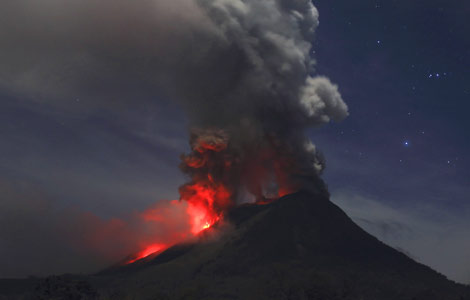Human transmissions of H7N9 'sporadic'
Updated: 2014-01-21 03:38
By SHAN JUAN in Beijing and WANG ZHENGHUA in Shanghai (China Daily)
|
||||||||
But there is no evidence that the virus will become sustained or widespread among humans, Bernhard Schwartlander said.
China has reported more than 200 human cases of H7N9 since March, the latest ones including a doctor in Shanghai who died from the infection at the weekend, according to statistics released on Monday by the National Health and Family Planning Commission.
"Since October, only one cluster was detected where human-to-human transmission might have occurred. We continue to expect only sporadic human cases," Schwartlander said.
He referred to a case involving a 30-year-old man and his father-in-law in Zhejiang province. The local health authority said that the possibility of limited human-to-human transmission couldn't be ruled out in the case, which was reported in December.
However, Schwartlander said it is not known whether H7N9 will cause a pandemic.
Sustained human-to-human transmission is usually needed for a pandemic, but so far "there is no evidence of sustained or widespread human-to-human transmission of the virus, which infects both birds and humans," he stressed.
Feng Zijian, deputy director of the Chinese Center for Disease Control and Prevention, said at a media event on Monday that there have been no mutations of the virus in terms of drug resistance, viral activity and in transmission capacity since March.
"So there is no need to panic, although more human cases are expected in coming days," he said.
The H7N9 bird flu virus tends to be more active in winter and such a period of stronger viral activity might last into early spring, he noted.
Most of the recent cases in China were in southeastern areas, with an average of five newly confirmed human H7N9 cases reported each day, Feng said, citing results from the center's national epidemic surveillance network.
The main transmission route for the virus remains from birds to humans, Feng added.
Among the cases reported, up to 70 percent had had contact with birds, he said.
Health authorities will remain on high alert for any viral activity and carry out timely epidemiological background investigations in case of new infections, he said.
On Saturday, two men in Shanghai died after being infected with the H7N9 virus, the city's health authority said in a report on Monday.
One was a 31-year-old doctor and the other a 77-year-old farmer. Both died early in the morning and tested positive for the H7N9 virus on Sunday, the municipal commission of health and family planning said.
Shanghai Pudong New Area People's Hospital said on Monday that the doctor who died was Zhang Xiaodong, a surgeon at the hospital.
The hospital denied that Zhang contracted the virus from patients, saying that it has handled no H7N9 cases.
Seven human H7N9 infections have been reported in different areas of Shanghai, the city's health authority said.
"People who had close contact with those infected were placed under observation and reported no discomfort," it added.
Nationwide, Guangdong, Guizhou, Jiangsu, Zhejiang and Fujian provinces have reported new cases of human H7N9 bird flu infection in the first three weeks of the year.
In Guangdong, another patient with the virus has died despite treatment, a statement from the provincial health authority said on Monday. The patient, surnamed Yang, died on Sunday from respiratory failure, it said.
It was the third human H7N9 fatality since August in the province, which has confirmed 18 human cases of the virus since August.
Contact the writers at shanjuan@chinadaily.com.cn and wangzhenghua@chinadaily.com.cn.
Wang Hongyi contributed to this story.

 Mount Sinabung erupts
Mount Sinabung erupts
 Commemorations to honor Martin Luther King Jr.
Commemorations to honor Martin Luther King Jr.
 Thrillseeker enjoys the hammock in the sky
Thrillseeker enjoys the hammock in the sky
 Babies baptised during a mass ceremony
Babies baptised during a mass ceremony
 Winter cultural festival opens in Xinjiang
Winter cultural festival opens in Xinjiang
 Air travel to Taiwan continues to take off
Air travel to Taiwan continues to take off
 Panda cub in Washington makes her public debut
Panda cub in Washington makes her public debut
 Spring Festival preparations across China
Spring Festival preparations across China
Most Viewed
Editor's Picks

|

|

|

|

|

|
Today's Top News
Memorial hall reflects on Japan's aggression
Missionary wants US to get him home
Tech park visits Bay Area
US may be losing in globalization
Students develop apps for campus life
Three dead in China food poisoning
Beijing blood donations drop
US commemorates Martin Luther King Jr.
US Weekly

|

|






